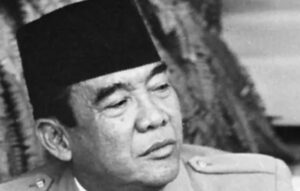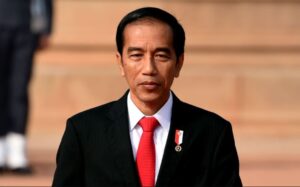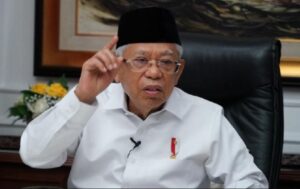Indonesia, the world’s largest archipelago, has seen a range of leadership since its declaration of independence in 1945. The following table presents the presidents of Indonesia in order, along with their years in office:
READ ALSO: Presidents That Have Ruled China Till Date
| No. | President | Years in Office |
|---|---|---|
| 1 | Sukarno | 1945–1967 |
| 2 | Suharto | 1967–1998 |
| 3 | B. J. Habibie | 1998–1999 |
| 4 | Abdurrahman Wahid | 1999–2001 |
| 5 | Megawati Sukarnoputri | 2001–2004 |
| 6 | Susilo Bambang Yudhoyono | 2004–2014 |
| 7 | Joko Widodo | 2014–present |
The First President: Sukarno

Sukarno, born in 1901 in Surabaya, was a key figure in Indonesia’s fight for independence from Dutch colonial rule. He was the son of a Javanese school teacher and a Balinese noblewoman.
Before becoming the first president, Sukarno was a prominent nationalist leader. He co-founded the Indonesian National Party (PNI) in 1927, advocating for independence. Sukarno’s political activism led to multiple imprisonments and exiles by the Dutch authorities.
Notable Achievements
Sukarno was instrumental in proclaiming Indonesia’s independence on August 17, 1945. He introduced the concept of Pancasila, the five principles that became the foundation of the Indonesian state.
His tenure was marked by efforts to unify the diverse archipelago, and he played a significant role in the establishment of the Non-Aligned Movement during the Cold War.
Downsides
Sukarno’s later years in power saw increasing political instability. His “Guided Democracy” policy led to authoritarian rule, and his economic policies resulted in hyperinflation and economic stagnation.
The final years of his presidency were overshadowed by the growing influence of the military and the rise of General Suharto, leading to his eventual ousting in 1967.
READ ALSO: Presidents That Have Ruled Cape Verde Till Date
The Current President: Joko Widodo

Joko Widodo, commonly known as Jokowi, was born in 1961 in Surakarta (Solo), Central Java. He comes from a humble background, with his father being a wood trader.
Jokowi started his political career as the Mayor of Surakarta from 2005 to 2012. His successful governance, characterized by his populist style and hands-on approach, led to his election as the Governor of Jakarta in 2012. In 2014, he made history by becoming the first Indonesian president not from the military or political elite.
Notable Achievements
Jokowi’s presidency has been marked by significant infrastructure development, including the construction of highways, ports, and airports across the country.
He has also focused on improving the country’s healthcare and education systems. Internationally, Jokowi has strengthened Indonesia’s position within ASEAN and on the global stage.
Downsides
Despite his achievements, Jokowi’s administration has faced criticism for its handling of human rights issues, particularly regarding freedom of speech and the treatment of minority groups.
His economic policies, while ambitious, have sometimes been criticized for increasing the country’s debt. Additionally, his relationship with the military and handling of environmental issues, particularly deforestation, have been points of contention.
READ ALSO: Presidents That Have Ruled India Till Date
The Current Vice President: Ma’ruf Amin

Ma’ruf Amin was born in 1943 in Kresek, Tangerang, West Java. He is of Bantenese descent, a region known for its deep Islamic traditions.
Before becoming Vice President in 2019, Ma’ruf Amin held various roles within the Islamic community and government.
He served as the chairman of the Indonesian Ulema Council (MUI) and was a key religious advisor to previous administrations.
He was also a member of the Presidential Advisory Council and has been involved in politics through the Nahdlatul Ulama, the largest Islamic organization in Indonesia.
Notable Achievements
As Vice President, Ma’ruf Amin has focused on promoting moderate Islam and social justice. He has been an advocate for economic empowerment programs aimed at reducing poverty and inequality, particularly among the country’s Islamic boarding schools (pesantren) and small businesses.
Downsides
Ma’ruf Amin’s conservative stance on certain social issues has sometimes clashed with Jokowi’s more progressive policies, leading to criticism from more liberal segments of the population.
His involvement in the controversial blasphemy case against former Jakarta Governor Basuki Tjahaja Purnama (Ahok) has also been a source of division among Indonesians.
Conclusion
The leadership of Indonesia has evolved significantly since its independence, with each president contributing uniquely to the nation’s development.
From Sukarno’s foundational role to Jokowi’s modernizing influence, Indonesia’s political landscape reflects a complex interplay of history, culture, and governance.
The journey of these leaders, including the current Vice President Ma’ruf Amin, highlights the challenges and triumphs of steering one of the world’s most diverse nations.
